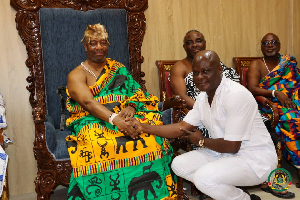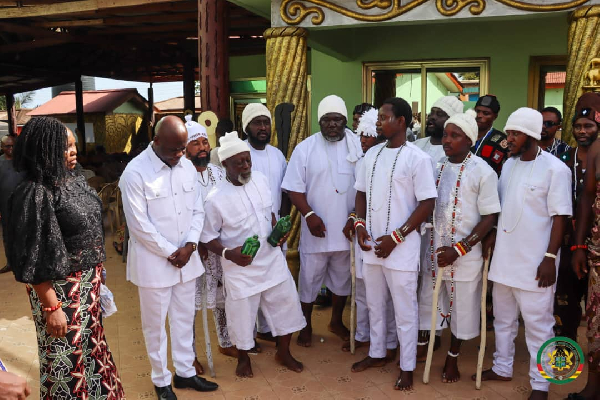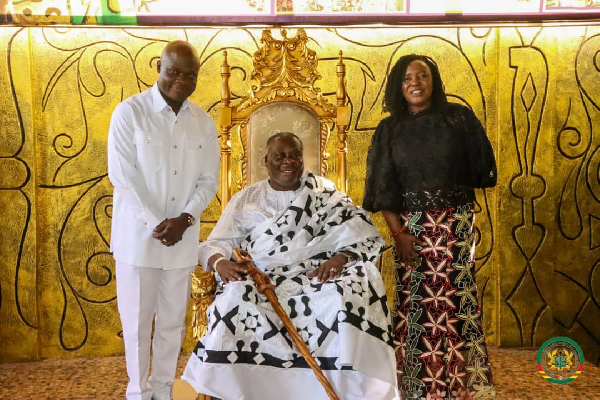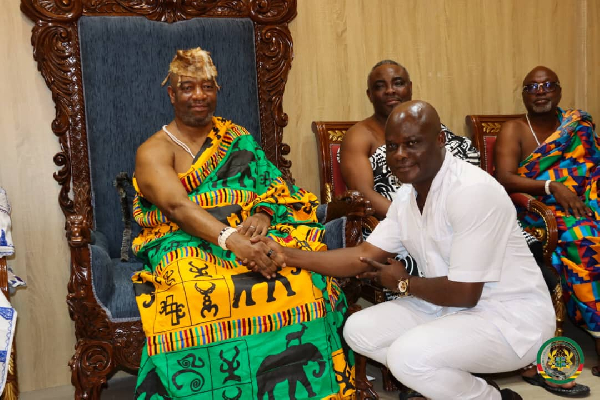 The Hon. Minister Ahmed Ibrahim exchanges pleasantries with the Ga Mantse, Nii Tackie Teiko Tsuru II
The Hon. Minister Ahmed Ibrahim exchanges pleasantries with the Ga Mantse, Nii Tackie Teiko Tsuru II
In Ghana, leadership has always had more than one face. Beyond elected office and institutional structures, there exists a timeless power, the stool, the skin, the spiritual seat of ancestral authority. From the palace courtyards to the village squares, traditional leaders remain the first call of the people, the last word in community life, and the unshaken symbols of Ghanaian identity.
As the Ministry of Local Government, Chieftaincy and Religious Affairs (MLGCRA) undertakes the historic reintroduction of the National Sanitation Day (NSD), we are not just launching a policy, we are reviving a national movement. And as this campaign is reborn, it must be rooted in the wisdom and reach of our most trusted mobilizers: our traditional rulers.
The very notion of sanitation is not new to Ghanaian tradition. Before organized municipalities and metropolitan assemblies, communities cleaned themselves not by compulsion but by culture. Monthly communal labour days, instituted by chiefs and elders, were common in many Ghanaian towns. Refuse collection, clearing of choked gutters, and the desilting of streams were considered acts of both hygiene and honour.
The reintroduction of the National Sanitation Day is, in many ways, a return to these values codified, enhanced, and systematized.
These efforts were more than civic duty; they were rooted in a deep cultural consciousness. In many instances, cleaning was performed in preparation for traditional festivals, religious observances, and significant royal events, reinforcing the idea that cleanliness was a collective spiritual responsibility.

The Ministry’s recent engagements with revered traditional authorities like the Ga Mantse, King Tackie Teiko Tsuru II, and Nii Odaifio Welentsi III, Nungua Mantse and President of the Greater Accra Regional House of Chiefs, have illustrated the immense potential that lies in collaborative leadership.
In Gamashie, where tradition breathes through every alley and festival, the call for sanitation was not heard as a government appeal, but as a royal command. When a chief speaks, the people respond not with reluctance, but with readiness. And in that lies the core of what the NSD aims to harness; organic social mobilization driven by cultural legitimacy.
The Ministry’s unique mandate, encompassing local governance, religious affairs, and chieftaincy, places it at the crossroad of policy and heritage. This is no coincidence, it is strategy. Sanitation is not merely a technical or logistical issue. It is a behavioural one, influenced deeply by belief systems, communal values, and leadership structures.
In bringing traditional leaders into the sanitation agenda, the Ministry seeks to institutionalize collaboration. We are not just asking for endorsements. We are designing a framework where traditional authorities will become co-architects of the National Sanitation Day from local competitions to regional mobilizations and inter-community rankings.

What emerges is a model that is not only government-led, but community-owned and culturally activated, blending tradition with innovation, and protocol with participation.
In a global era where culture is being studied and admired, Ghana’s traditional structures offer profound lessons in grassroots engagement. Students of anthropology, community development, and public health from across the world have long looked to Ghana for models in indigenous governance and social compliance. The NSD will create space for international researchers, development partners, and cultural scholars to witness, study, and support a sanitation model anchored in heritage.
Through this, Ghana positions itself as a living case study in how tradition can inform development, and how age-old systems can guide contemporary solutions.
The reintroduction of the National Sanitation Day is more than a campaign. It is a reawakening. And its strength lies not just in bins, trucks, or laws but in the drums of the durbar, the declarations of the elders, and the collective will of a people whose identity is inseparable from their soil.
Our traditional rulers are not relics. They are reformers. In their courts lie not only customs, but capacity; capacity to inspire, to enforce, and to lead transformation.
As we look ahead, we invite all Ghanaians and our global friends to join us in this movement. For a clean environment is not only our responsibility. It is our heritage.
(The writer is a Public Relations Officer with the Ministry of Local Government. Chieftaincy and Religious Affairs and a Staff of the Information Services Department (ISD)
darling.cann@mlgrd.gov.gh
darling.cann@isd.gov.gh)


